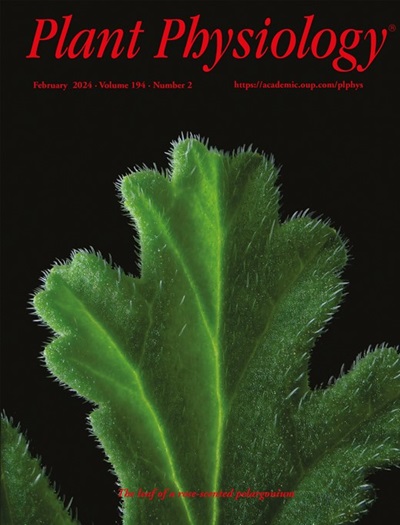Expression of the polyphenol oxidase gene MdPPO7 is modulated by MdWRKY3 to regulate browning in sliced apple fruit
IF 6.5
1区 生物学
Q1 PLANT SCIENCES
引用次数: 0
Abstract
Browning is a pervasive problem in horticultural products, substantially diminishing the appearance, flavor and nutritional value of fruit, including important fruits like apple (Malus × domestica Borkh.). In this study, we compared the physiological characteristics of the browning-resistant line ‘Rb-18’ with the susceptible variety ‘Fuji’ and found that the polyphenol oxidase (PPO) enzyme activity and phenolic content of Rb-18 were significantly lower than those in Fuji. In addition, the PPO enzyme in Fuji showed a stronger affinity for its substrate, catechol, compared to Rb-18. Through transcriptome and RT-qPCR analyses, MdPPO7 expression was identified as contributing to flesh browning after cutting. Subsequent fruit injection and stable genetic transformation of the MdPPO7 gene into apple fruit and calli determined that syringic acid, procyanidin, phloridzin, chlorogenic acid, gallic acid, catechin, and caffeic act as its catalytic substrates in the process involved in browning. Furthermore, luciferase reporter, yeast one-hybrid, β-glucuronidase reporter assays and chip-qPCR analysis demonstrated that a WRKY transcription factor(MdWRKY3) binds to the promoter region of polyphenol oxidase gene (MdPPO7) and positively regulates its expression to promote apple flesh browning. This study provides insights into the molecular regulatory mechanisms of fruit browning in fresh-cut apples and provides a theoretical basis for the generation of high-quality apple germplasm resources.多酚氧化酶基因 MdPPO7 的表达受 MdWRKY3 的调控,从而调节苹果切片果实的褐变过程
褐变是园艺产品中普遍存在的问题,会大大降低水果的外观、风味和营养价值,包括苹果(Malus × domestica Borkh.)等重要水果。在这项研究中,我们比较了抗褐变品系'Rb-18'和易感品种'富士'的生理特性,发现 Rb-18 的多酚氧化酶(PPO)活性和酚含量明显低于富士。此外,与 Rb-18 相比,富士的 PPO 酶对其底物儿茶酚的亲和力更强。通过转录组和 RT-qPCR 分析,MdPPO7 的表达被确定为导致果肉在切割后褐变的原因。随后对苹果果实和胼胝体进行果实注射和 MdPPO7 基因的稳定遗传转化,确定丁香酸、原花青素、绿原酸、没食子酸、儿茶素和咖啡酸是褐变过程中的催化底物。此外,荧光素酶报告、酵母单杂交、β-葡萄糖醛酸酶报告分析和芯片-qPCR分析表明,WRKY转录因子(MdWRKY3)与多酚氧化酶基因(MdPPO7)的启动子区域结合,并正向调控其表达,促进苹果果肉褐变。该研究深入揭示了鲜切苹果果实褐变的分子调控机制,为优质苹果种质资源的培育提供了理论依据。
本文章由计算机程序翻译,如有差异,请以英文原文为准。
求助全文
约1分钟内获得全文
求助全文
来源期刊

Plant Physiology
生物-植物科学
CiteScore
12.20
自引率
5.40%
发文量
535
审稿时长
2.3 months
期刊介绍:
Plant Physiology® is a distinguished and highly respected journal with a rich history dating back to its establishment in 1926. It stands as a leading international publication in the field of plant biology, covering a comprehensive range of topics from the molecular and structural aspects of plant life to systems biology and ecophysiology. Recognized as the most highly cited journal in plant sciences, Plant Physiology® is a testament to its commitment to excellence and the dissemination of groundbreaking research.
As the official publication of the American Society of Plant Biologists, Plant Physiology® upholds rigorous peer-review standards, ensuring that the scientific community receives the highest quality research. The journal releases 12 issues annually, providing a steady stream of new findings and insights to its readership.
 求助内容:
求助内容: 应助结果提醒方式:
应助结果提醒方式:


